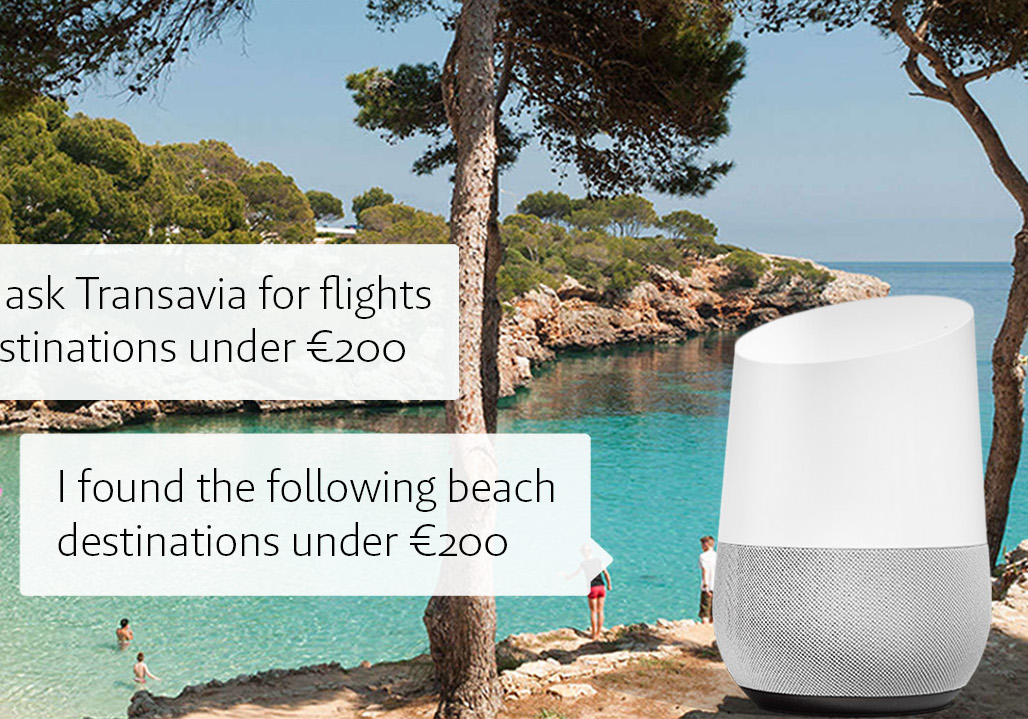Together with Transavia we created the Transavia Voice Assistant: by talking to your Google Home or Amazon Alexa, passengers can easily explore travel destinations and book their tickets.
And in doing so, we enhanced the current flight search experience so that it perfectly suits the passengers’ need for effortless orientation and ticket booking. We are very proud that this case is nominated for the SpinAwards 2018 in the category of Artificial Intelligence and for the DIA Awards in the category of New Interfaces.
The goal: enhancing the flight search experience
Enhance the current flight search experience so that it perfectly suits the passenger’s need for effortless orientation and ticket booking.
The challenge: develop a deep connection with customers
Transavia is looking to develop a deep connection with its customers. In a highly competitive travel market, exploring new opportunities and learning what customers want now and need tomorrow is a key asset. Conversational Interfaces are a new touchpoint that is quickly becoming omnipresent in our daily lives. It offers a new frontier that will shape how we experience brands and interact with their services.
Our approach: implementing a Conversational Interface
Our research shows that people often do not have a set destination or travel period in mind. Naples, Malaga or Sevilla can all be interesting destinations to travel to, but in the end ticket prices and the flight schedule are the determinant factor. We set out to create a conversational interface that not only offers you the option to find flights if you know where you want to fly to, but also a possibility to find destinations based on the underlying drivers such as themes (beach destinations, city trips), budget and time of travel.
While we have built a great service that talks with our customers, the focus is on listening. Being relevant and offering an effortless customer journey is what counts.
Vanja Mlaco, Coach Digital Team Transavia
The result: smart voice assistant
Our team of dialogue designers and dialogue engineers built voice interfaces on Google Home and Amazon Alexa with the goal to create smart and added value experiences. The skill developed for the Amazon Alexa, helps users find tickets to the destination they have in mind. It keeps track of your preferred departure airport and other smart defaults to create a swift interaction. We also offer the best possible value and notify you if we find cheaper options around the dates you want to travel on.
The Google Home app also offers a way to find travel inspiration based on what type of destination, your travel budget and or the travel period. Just say: “OK Google, ask Transavia for beach destinations around 100 Euros” and it will offer you the most relevant options Transavia’s expanding network has to offer. Once you have found your flight, you will experience a seamless handover to your smartphone for the payment process.
The details: exploring the possibilities
Transavia is the first airline that integrates voice user interaction in the customer journey. Voice user interfaces have the future, so we are constantly exploring the possibilities. This year, 17 languages including Dutch will be added to the Google Home, which will result in a steep increase of usage and new conversational services being launched.
With the development of this bot experience, Mirabeau leveraged all the advantages that cloud technology offers, to accelerate the time-to-market and gather real-time feedback. And through machine learning, the voice assistant learns from every user interaction. After all, true innovation begins by learning from the experiences of people, so that we can optimize our services.
